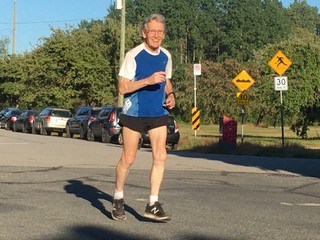
You could say Rod has donated his body to science – even though he’s still very much using it! Rod has participated in so many research studies, he calls himself a human guinea pig. He is a truly unique test subject and we are fortunate to have him as one of our patient partners.
This past April, Rod Waterlow was beyond excited to qualify for the 2020 Boston Marathon – his third trip to the famous race. He and his wife, Karen, went all out planning an epic adventure that included stops in Montreal, New York, and Miami, culminating in a cruise through the Caribbean.
Then the pandemic hit: the run and the trip were cancelled.
Rod’s biggest disappointment? That the 83-year-old wouldn’t be able to experience the event as the year’s oldest qualifier.
As a consolation, race organizers decided the 30,000 qualifiers could run virtual marathons in their home towns in September. So Rod amended his work-out regimen and continued to train. Then, with the race just one week away, thick smoke rolled across the Pacific Northwest.
“My training runs were exhausting. And I was thinking, ‘Am I really going to put my life in danger for this?’” Rod decided it was too risky. But he got yet-another second chance when the organizers offered an extension to runners on the West Coast.
The morning of September 20 dawned clear and bright. Despite an annoying knee injury and only a handful of supporters along the way, Rod completed the 42.2 kilometers in just under five hours. He arrived at the finish line in Stanley Park to a small but enthusiastic crowd of family and fans who presented him with a homemade laurel wreath and cardboard medal.
Run as if your life depends on it
The virtual Boston was Rod’s 35th full marathon. Not bad for a man with COPD who didn’t start running until his late 40s!
Chronic obstructive pulmonary disease (COPD) affects more than 3 million Canadians; it’s the number one cause of hospital admissions. But if you live with COPD, it’s good to live in British Columbia. That’s because St. Paul’s own brilliant lung specialist, Dr. Don Sin, is second in the world in COPD and asthma research. And St. Paul’s Heart Lung Institute (HLI), headed by Dr. Sin, is ranked first in Canada and third in the world.
Rod himself has become a bit of a legend at HLI. He’s been an active participant in their COPD research since his diagnosis 10 years ago. He is renowned for choosing not to take sedation and for rarely coughing during his bronchoscopies.
Rod explains, “If I’m awake, I can watch on the monitor. It’s amazing to see inside your own lungs!”
Thanks to Rod and all of our patient partners (folks who volunteer or donate their tissue as part of our research programs), Dr. Sin and his team are on the cusp of a golden age in lung research. We are closing in on the promise of not only treating COPD, but one day preventing it.
Head, shoulders, knees, and toes
HLI is just one of the many beneficiaries of Rod’s scientific generosity.
He participated in a study about the impact of air quality in traffic that had him breathe polluted air for two hours. “The age cut off for that one was 75, so I had to talk them into letting me participate,” he laughs. “And my wife couldn’t figure out why anyone would volunteer for something like that.” But as a runner, Rod knew how important it was.
Once, he had a CAT scan to measure his brain function while answering questions and doing various tests via keyboard.
He’s part of a long-term study at UBC looking at extreme athletes over age 35. They are perceived to be very fit and healthy, but they may actually be at higher risk of heart attack.
And then there are the colonoscopies. They started when Rod saw an ad in the paper looking for people to join the FIT screening program (Fecal Immunochemical Test). Of course, he signed up immediately. That test came positive: a sign of pre-cancer. Rod had the first of his many colonoscopies shortly after.
During a recent consultation, Rod’s doctor was blunt. “He said it was a good thing I had the FIT when I did. Otherwise, I’d have colon cancer by now.” Not surprisingly, Rod’s advice to others is equally blunt. “Colonoscopies are not that big a deal. If you need one, don’t put it off!”
What’s next?
What’s next on Rod’s bucket list? Well, he’s in no rush to complete another marathon, but that hasn’t stopped him from running. “I don’t want to aggravate my knee, so I’m just run-walking every other day for about 45 minutes.” Rod is confident there are still a few more kilometers left in his legs, but there won’t be any more races until COVID is under control.
And on the research front? “I’d like to have my whole genome sequenced. Who knows what they might find out!”
Dr. Janice Leung, one of the specialists at HLI agrees. “Rod is amazing. He should be commended for his research participation.”
We agree! Thank you, Rod.
When you give to Lights of Hope, you support the world-class research happening right here at St. Paul’s. And you make it possible for people like Rod Waterlow to get a second wind. Do the greatest good: give to Lights of Hope.
In November, Rod received his official finisher medal from the Boston Athletic Association.
